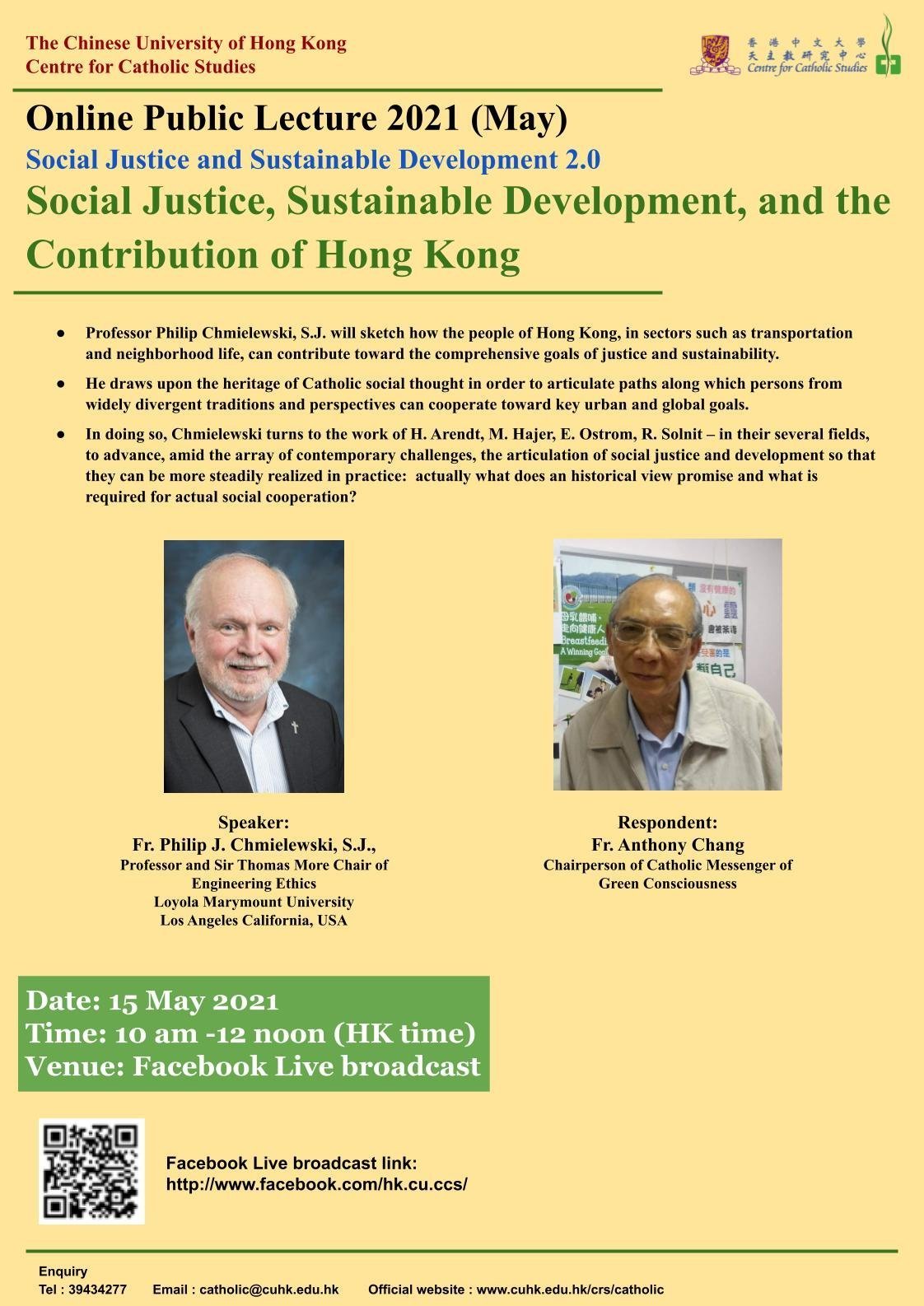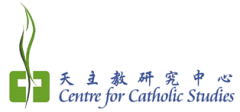
Social Justice, Sustainable Development, and the Contribution of Hong Kong (Part 2 of the Online Talk on 27 Feb 2021)
Speaker: Prof. Philip Chmielewski, S.J
Respondent: Fr. Anthony Chang
Replay Video
Download Full Version of this Summary
Summary
The Centre for Catholic Studies was pleased to host this sequel to Professor Chmielewski’s February lecture that combined Catholic teaching on social justice and groundbreaking theories of sustainable development. In this second lecture, he proposed ways in which Hong Kong can contribute to the world’s sustainable innovations by building on our strengths as a dense urban and financial centre.
But something fundamentally has to change, according to these principles that are also at the core of Catholic social teaching:
- Solidarity (understand our and others’ needs),
- Subsidiarity (decisions are made for, and by the person or local group),
- the Common Good (enable people to contribute to society), and
- Sustainable Development (care for the environment; people’s expressions of needs, hopes and desires are attended to).
Sustainability is more than about GDP, and cannot be achieved by decree or backroom decisions. A key theme that runs through Professor Chmielewski’s presentation is that people matter. Their informed, collaborative and deliberative participation is what makes societies viable and flourish.
Professor Chmielewski maps various ways Hong Kong could contribute, for example,
TRANSPORTATION: Hong Kong, a leader in international shipping, can regain our edge by working with local universities to develop more efficient “Eco Ships,” as well as clean, cheaper fuel (from solar, hydrogen, household waste) for shipping and aviation. The Hong Kong Government lags behind other cities in plans for greening public transport and commercial vehicles.
FINANCIAL CENTRE: In response to climate change, Hong Kong has not taken the lead to guide investments, educate or set financial standards toward environmental protection while seeking investment returns. Opportunities include underwriting regional and developing economies’ infrastructure initiative through sustainable engineering, green bonds, and an international emissions trading scheme, etc.
HONG KONG’S ENVIRONMENTAL POLICY: Professor Chmielewski quotes from Tristan Bove’s 2020 commentary on Hong Kong’s Environmental Policy (https://earth.org/hong-kong-environmental-policy): The Hong Kong Environment Bureau’s tepid emission reduction targets “belies the significant financial muscle of Hong Kong’s high-performing economy.” Hong Kong has “placed the onus of transitioning towards renewable energy on the private sector.” Furthermore, on the potential effectiveness of a carbon pricing market in Hong Kong, “all participants agreed that the government lacked sufficient transparency in making its environmental initiatives known to the public.”
In response to the Council for Sustainable Development, Friends of the Earth [and many local stakeholders] have urged the government to withdraw the controversial land reclamation project, Lantau Tomorrow Vision, which will irreversibly damage marine ecosystems and alter the hydrology and topography of the land.
[China ratified the Paris Agreement in September 2016 and announced its application to the Hong Kong Special Administrative Region according to the Basic Law.] The SAR government has yet to articulate milestones to “assess progress towards the 2050 decarbonisation goal.”
TRANSPARENCY AND DISCLOSURE: Transparency in ESG (environmental, social and governance) performance enhances reputation, trust and therefore financial returns. Has the government set a standard for CSR (Corporate Social Responsibility) or ESG disclosure?
According to the principle of subsidiarity, there is a role for independent civil institutions to maintain professional ethics, and oversee public goods.
INEQUALITY: A 2019 study found that climate change has already deepened the global inequality gap by around 25 percent. Inequality distorts public policy, weakens the sense of shared purpose, as well as public investment in education, infrastructure, and research.
In densely populated, lower-income countries close to the Equator, with weak economies and inadequate infrastructure, climate risks could lead to food shortages, mass migrations and other social breakdowns. (New York Times, 31 January, 2021)
From an engineering perspective, planning for a changing climate entails planning not only for climatic uncertainty but also for uncertainty about regulatory, environmental, economic, social, and other conditions affecting a project. Cross-pollination across disciplines thus minimizes risks and helps implement social justice.
Professor Chmielewski cites Binyamin Appelbaum, lead economics writer for the New York Times editorial board: “The field’s long-standing indifference to the distribution of prosperity has come at the particular expense of minorities,” or those on the margins. “Advocacy for the interest of ‘the people’ in the abstract, often ends up looking a lot like cruel indifference to actual people.”
Reflecting on poverty, local researchers have observed: “Hong Kong should establish a community-based body solely to nurture and monitor progress toward the Sustainable Development Goals with a precise set of local, measurable targets.” At a time when civil society is in disarray, Professor Chmielewski’s focus on neighborhoods and what makes them thrive opens the door to a different everyday practice.
Don’t Just Build Dwellings: Create Better Neighbourhoods Instead.
Climate Policy Requires Local Input
“[I]f left to its own devices, climate policy may become a technology-focused and even technocratic quest that creates little support along the way.” In Neighbourhoods for the Future: A Plea for a Social and Ecological Urbanism (TrancityXValiz University of Utrecht 2020), M. Hajer, et al. write: “We put forward the neighbourhood as a modest imaginary . . . While the actual work – the thinking, the doing, the committing – has to be done by local actors.”
From Tabula Rasa to Tabula Scripta
“Overvecht [in Utrecht] taught us how important it is to not try to build a future on what is new and seemingly innovative but to investigate what is already there and then to think how to change track and improve the neighbourhood.”
Professor Chmielewski gives the example of Peg, a community indicator system developed for Winnipeg by Winnipeggers (https://www.iisd.org/projects/peg). The indicators, developed by citizens, community groups and data experts, measure the city’s well-being in themed areas, such as basic needs, health, education & learning, social vitality and governance, built environment, economy, and natural environment. [In Hong Kong, Professor Wilson Wong Wai Ho, director of Data Science and Policies Studies (DSPS) at CUHK, among others, has been advocating genuine open data and a smart city not just in name, but in fact.]
Key components of a “good” neighbourhood include:
- the long-term commitment of local actors;
- a strong narrative that activates and mobilizes people;
- memories of who built, and what went on in the neighbourhood;
- simple rules with clear goals, yet leave room for trying out different solutions (“variability” principle);
- “survivability” principle, i.e., learn also from failures; the importance of feedback; “If the systems are relatively separable, allocating responsibility for experimenting with rules will not avoid failure, but will drastically reduce the probability of immense failures for an entire region” (Ostrom, Understanding Institutional Diversity);
- resources are created and circulate in the neighbourhood as much as possible, e.g., the recycling of waste into fuel, of water.
Aidan Davison notes in Technology and the Contested Meanings of Sustainability: “[W]hat seems worthy of being cared for in the present, what seems worthy of being sustained, only does so through being embedded in historical webs of narratives and practices that give expression to this worth.”
Voice, memories, and the exchange of stories matter. “The best storylines emerge out of a process of interaction.” They help build trust across barriers. And people have the capacity to learn. “Learning problem-solving skills in a local context generates citizens with more general problem-solving skills that enables them to reach out and more effectively examine far-reaching problems that affect all peoples living on this earth.”
The Old Testament and the New Testament tell the story of God’s movement in history, Professor Chmielewski reminds us. He finds parallels between God’s movement and Herodotus’ history-writing. He quotes Joel Alden Schlosser, Herodotus in the Anthropocene: Herodotus encourages his contemporaries
- “to exalt greatness, including the greatness of the inquirer, to pursue understanding to the point of exhaustion” (the Father’s creation)
- “to discover and elaborate an abundance of human practices” (the Son’s incarnation and com-mission)
- ”to celebrate human initiative and creativity” (the Spirit’s joyful diversity and sustenance)
Thus, Creativity versus acceptance of the given; Togetherness versus separateness, and Sanctity versus the profane
Creativity, togetherness and sanctity mark the communal movements of Father, Son and Spirit
Herodotus’ understanding of nomoi (laws and conventions) based on wonder and practice, not monoliths, could be a supplement to Catholic Social Teaching, Professor Chmielewski suggests.
A friend and close observer of Hong Kong, Professor Chmielewski understands our current deficits. He quotes Dr. Martin Luther King, Jr.: “We must accept finite disappointment, but never lose infinite hope.” Likewise, Hannah Arendt wrote in Between Past and Future: “[H]istorical processes are created and constantly interrupted by human initiative. . . .Hence, it is not in the least superstitious, it is even a counsel of realism, to look for the unforeseeable and unpredictable, to be prepared for and to expect ‘miracles’.”
Fr. Anthony Chang, long an advocate and practitioner of ecological awareness, responded from a pastoral, and Chinese cultural angle. He summed up his motivations as praxis, option for the poor and conscientization (awaken the poor and rich). He understands “wholeness” in a “cosmically comprehensive” sense: heaven 天 earth 地and human 人. He faults the modern Chinese translation of the Lord’s Prayer: “Your will be done among humans as it is in heaven” (cf. “Your will be done on earth as it is in heaven”) for narrowing the scope of God’s will, and causing complacency among specifically Catholics. He also compares food that points to heaven (Gen 1:29-30), (Is 11:6-9 peaceable kingdom) with meat-consumption and the cruelty of the livestock industry which accounts for emissions, loss of habitats and of species-diversity, and other environmental disasters.
Love of God and love of humans is not enough. We have to love the earth. Laudato Si’ teaches us we have a duty to love God and God’s creation. Fr. Chang laments that crude capitalism is the driver in Hong Kong, and objects to too much emphasis on financial tools. Pastorally he works to foster a new generation of families (by promoting breast feeding, vegetarian diet) that centers on love, wholeness and sustainability, from the grassroots level.
Professor Chmielewski clarifies that for him social justice is about creating the means for people to come together, discuss and bring about changes for the Common Good.
This summary does not do justice to the abundant examples Professor Chmielewski gave during the lecture. We invite readers to view the recording of the lecture.
Extended Reading (a partial list):
- Bove, Tristan. “Hong Kong’s Environmental Policy: Unique or Stagnant?” Earth.org. (https://earth.org/hong-kong-environmental-policy/; accessed 22 August, 2021)
- Davison, Aidan. Technology and the Contested Meanings of Sustainability. (Albany: SUNY Press, 2001)
- Hajer, M. et al. Neighbourhoods for the Future: A Plea for a Social and Ecological Urbanism (TrancityXValiz with Urban Futures Studio, University of Utrecht, 2020)
- Lantau Tomorrow Vision, read up on the massive, controversial land-reclamation project and views expressed by pro-development groups as well as those in opposition (Save Lantau Alliance)
- Latour, Bruno. Down to Earth: Politics in the New Climatic Regime. (Cambridge: Polity Press, 2018)
- Elinor Ostrom, Understanding Institutional Diversity (Princeton, NJ: Princeton University Press, 2005)
- Schlosser, Joel Alden. Herodotus in the Anthropocene. (Chicago: University of Chicago Press, 2020)
- Solnit, Rebecca. Hope in the Dark: Untold Histories, Wild Possibilities, 2nd ed. (Chicago: Haymarket Books, 2016)
- Subramanian, K. “Advancing neighbourhood sustainability assessment by accounting for sustainable development goals: A case study of Sha Tin neighbourhood in Hong Kong” in Sustainable Cities and Society, Volume 66, March 2021.
- Studies by International Institute for Sustainable Development, SOCUBE (CUHK), for example.

